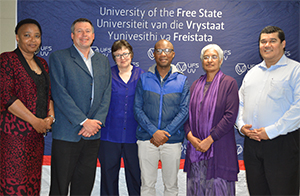Latest News Archive
Please select Category, Year, and then Month to display items
12 October 2020
|
Story Arina Engelbrecht
|
Photo Supplied
 Arina Engelbrecht from Organisational Development and Employee Well-being believes physical activity has a number of benefits for one’s health, including stress relief.
Arina Engelbrecht from Organisational Development and Employee Well-being believes physical activity has a number of benefits for one’s health, including stress relief.
Being physically active plays a big role in preventing the development of mental-health problems and in improving the quality of life of people experiencing mental-health problems.
Treatment for depression
Physical activity can be an alternative treatment for depression. It can be used as a stand-alone treatment or in combination with medication and/or psychological therapy. It promotes all kinds of changes in the brain, including neural growth, reduced inflammation, and new activity patterns are formed that promote feelings of calm and well-being. It releases endorphins – powerful chemicals in the brain that energise your spirit and make you feel good.
Physical activity can be very effective in relieving stress. Research in adults has found that physically active individuals tend to have lower stress levels compared to individuals who are less active. It also leads to improved sleep. When a person sleeps better and feels more rested, overall quality of life improves. They cope better with daily life stressors.
Reduce Alzheimer's risk
Regular physical activity can reduce your risk of developing Alzheimer's disease by up to 50%. It can also slow down further deterioration in those who have already started to develop cognitive problems. It stimulates the brain’s ability to maintain old connections as well as to make new ones.
A study asked people to rate their mood immediately after periods of physical activity (e.g. going for a walk/run, cycling, doing housework) and periods of inactivity (e.g. reading a book or watching television). Researchers found that participants felt more content, more awake, and calmer after being physically active compared to after periods of inactivity.
In conclusion, people who are physically active feel a sense of well-being, feel more energetic throughout the day, sleep better at night, have sharper memories, and feel more relaxed and positive about themselves and their lives.
“Being physically active not only changes your body, it changes your mind,
attitude, and your mood.” – Arina Engelbrecht
Qwaqwa Campus launches new degree in Community Development
2016-11-29

Photo (from the left): Morongoe Mohaleroe
(Department of Social Development), Albert Schoeman
(Assistant Dean: Faculty of the Humanities),
Dr Elsa Crause (Campus Vice-Principal:
Academic and Research), Grey Magaiza
(Programme Head: Community Development),
Dr Margie Maistry, and Prof Darren Lortan
(both from Durban University of Technology).
From 2017, the Qwaqwa Campus of the University of the Free State will offer a new professional degree in Community Development. This was revealed during the launch that was recently held on the campus.
Speakers acknowledged the positive contribution the new degree was expected to make in the region, especially in mobilising the civil society to join hands with the government in improving the quality of life in South Africa.
“There has always been a dire need for such a degree in this part of the country,” said Morongoe Mohaleroe, the Thabo Mofutsanyana District Director in the Department of Social Development.
“Our department is working hard at both national and provincial levels to professionalise this sector, and the qualification will definitely help in that regard,” she said.
Mohaleroe also thanked the campus for supporting her department with community-based research and studies by students.
Speaking during the launch, the Campus Vice-Principal: Academic and Research, Dr Elsa Crause, said the campus was proud to be the first in the country to offer this professional qualification.
‘‘What has brought us all here today, is history in the making,’’ she said to an audience consisting of a broad spectrum of stakeholders, including government and civil society structures like Save the Children and World Vision.
“Our campus will be the first in South Africa to offer this type of degree and a maximum of only 35 students will be accepted,” she added.
For more details, prospective students may contact Grey Magaiza (Programme Head: Community Development) at magaizag@ufs.ac.za or +27 58 718 5419.